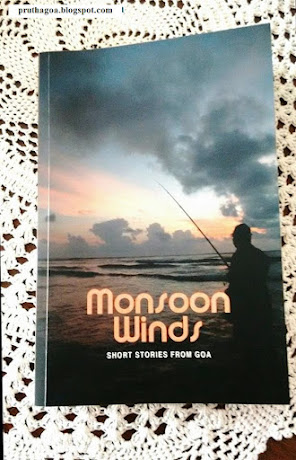Monsoon Winds: A Review
Fundação Oriente India prides itself on embracing languages that reflect Goa’s rich linguistic history within the sphere of its biennial Goan Short Stories Competition. The participants can submit their entries in Konkani (Romi or Devanagari scripts), English, Marathi and Portuguese in 1,000 to 3,000 words. The competition began in 2011 and following every edition of the competition there has been a release of a book containing stories by the winner and finalists. The 2015 edition of the Goan Short Stories Competition resulted in Monsoon Winds: Short Stories from Goa.
Nayana Adarkar’s ‘Rakhondar: The Protector’ is a reminder of the patriarchal system that has its vice grip on Indian women wherein women are passed on from one male family member to another under the guise of protection. She derides this system of protection by pointing out that it is she who ends up doing all the protecting. The position of the middle class and lower middle class Indian woman is still to a large extent one of male servitude and usually goes unnoticed and unappreciated as it is taken for granted. The burden has increased for Indian women as they find themselves having to contribute to financially supporting their families and carrying on with their household duties as in the days of yore. The critique comes to an unnerving halt when an assertive female figure at the start of the story, now an older woman, makes the plea, ‘Vandan, I cannot live alone any longer – I am terrified. Please find me some man to give me company’. The story presents the strange conundrum that Indian women in particular face: they are seen to be tormented with or without a man in their lives, thanks to the diktats of the patriarchy.
The author presents the story through the mind of her protagonist who has a sense of humour that keeps her from self-destructing. The light-hearted tone of the story serves to underscore the tragedy of being a woman trapped in a patriarchal system. Needless to say, Nayana Adarkar’s short story, which was originally written in Konkani, won the first prize at the competition.
Suvarna Bandekar’s ‘Marline the Fisherwoman’, which won the second prize, tells the story of Marline, who has gone missing. Marline’s entire life story comes together through the gossip between the women in the tale while she remains in the shadows. It is an entertaining story with a surprising, but happy twist.
‘Salad’ by Rochelle Potekar is one of the more powerful stories in the book, which surprisingly did not win a prize. Two plots run parallel to each other, finally converging at the climax. The story reveals the plague of paedophilia and sex trafficking that is ruining Goa. The ending is open ended in a way that points to our own state’s uncertain direction in this area where the concerned authorities do little or nothing.
Vithal L Gawas’ ‘São João’ follows the romantically disappointed Anthony who plots to kill his rival and ends up completely befuddled after being saved by him. Fátima M Noronha writes about Cassian, an ungrateful son, who meets an unfortunate fate, and his devious neighbour Leena. The inability to locate Cassian shifts from echoes of the paranormal and shades of the comical to a completely discernible sorry state of affairs when the details of the situation are revealed. ‘A Litany of Emeliana’s Sins’ is tragic tale of star-crossed lovers brought down by the pride of one woman. Written by Lisbern Shawn, the tale is engrossing for the disclosure of secrets offered to the reader at intervals. The archetypal Goan characters in this story, as well as in most of the other stories, remind us of somebody we have met or is part of a piece of gossip we have heard.
Monsoon Winds makes a good relaxing read on a rainy evening, sipping tea and recalling one’s own memories and experiences that could identify with the prose of the authors. The book is a valuable documentation of the literary talent Goa possesses while the Goan Short Stories Competition cultivates the potential we have.
(Originally published in June 2018)





Comments
Post a Comment